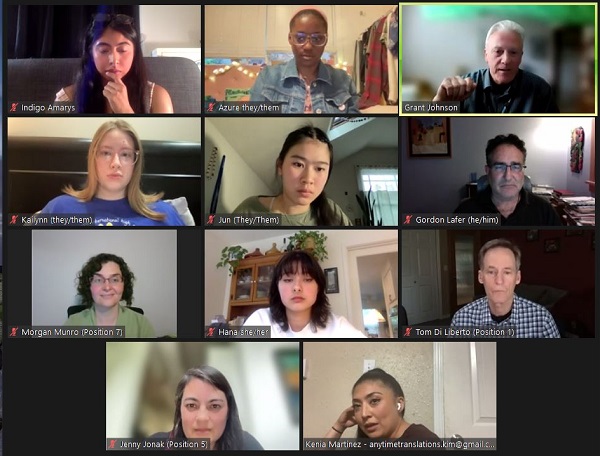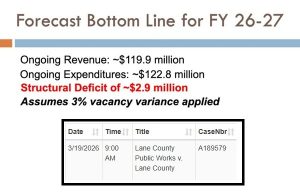Meet the candidate: Grant Johnson
12 min read
At the Community Alliance of Lane County youth-led forum, school board candidate Grant Johnson.
[00:00:05] Grant Johnson: Hello everybody. I’m Grant Johnson and I have not been in my home state of Oregon for 44 years, so I’m just a little bit new coming back in. I left in 1978, went in the Air Force and did a full career, and then I went back and worked for the Air Force for another full career. Just retired in 2021.
[00:00:29] And I’ve been on the receiving end, actually, a lot of young people coming into the Air Force. I’ve spoken with all of them that would come to Dover Air Force Base. And I’ve got a feel for people that are coming from a lot of different places all around the country, as well as foreign countries.
[00:00:49] So I’ve kind of got a feel of how education and what young people have been saying that their K-through-12 experience has been. And then we see it on the other side as being, I guess you would call it, the employer, back before I retired and I was coming back to Oregon, (I’m) fortunate to be back here in my home state.
[00:01:10] I’ve just been a little bit concerned about the place that Oregon sits: 44th, I think I recall, in the outcomes that you young folks are getting for education. And I have been a manager, an administrator for many years. I’ve been in the education and training world. Actually, I was the training manager for Dover Air Force Base for the last 20 years.
[00:01:35] And I’ve come back, not just to retire, but to be part of the community and to serve and your future is actually our future. And so I, what I’m coming to do is to basically serve you and make sure that the education that you’re receiving is going to prop you up and have you ready to step out into the community and do well.
[00:01:58] And that’s basically why I’m here. So thank you for the time.
[00:02:02] Azure (North Eugene): Hello, I’m Azure from North. We are seeing issues with transparency in board members making decisions without listening to our student body or staff. More specifically, students and staff have felt like the district has rushed through new high school schedule without much transparency. The first question is, how do you plan to prevent the district from making hasty decisions where students and staff feel unheard? Grant, you’re up.
[00:02:30] Grant Johnson: This is a good question. Within the instructional systems development design, which is whatever type of educational system that you have, there’s the considerations of a lot of things all the way from the building and the structure, all the finances and everything that goes into your education.
[00:02:50] And I think your question’s a good one about transparency, and this is what I’ve really been living in the middle of for so many years, is, you are not able just to make a snap decision. And when you’re on a board, I think that transparency that you’re talking about means that it’s not just the monthly board meeting that is taking place.
[00:03:13] There’s conversation, there’s the background study, that goes into everything that’s going to finally be a vote and a decision. And what I really believe in and that transparency is, is that there has to be a way to be able to have an open ability for not only the students to have the input, but just remembering the fact is, is one thing I never thought of was who’s paying for this educational system.
[00:03:41] And all the public that’s local that’s paying for it needs to know what’s going on with the board. And I think the board needs to be able to put out what the thought process is that’s going behind the decisions. And there’s plenty of ways to be able to do that and open up those doors. And hopefully that answers your question about the transparency, because these are big decisions and everyone, including the students, needs to have an input to it.
[00:04:07] Azure (North Eugene): Thank you so much. And the second part of this question is how do you plan to help ease students’ minds with this new transition? Grant?
[00:04:16] Grant Johnson: I’m going to go back to what Morgan said earlier about the whole big picture and what you’re looking at as what the goal is out in the future and in your perspective as students when you know that you have so much that you’ve got to learn and to master before you graduate.
[00:04:37] I think in looking at it that way, and then working back from that, what is it that we need to accomplish? And I can’t claim that I know a whole lot about the curriculum right now. I haven’t seen it but I think it’s important to know futuristically what it is that you need to accomplish. And I’m not sure that that is something that is going to be really an ease on your mind.
[00:05:00] I’ve heard students say, you know, you get around final time and it gets stressful. Growing up is stressful, I’m sure, but I think it’s really important to keep that goal in mind, what it is that needs to be accomplished. And there’s something in the mind that transforms when you know that you must accomplish something out in the future. And then that kind of sets things in place.
[00:05:24] But I’m not sure that anybody can really ease your minds about this because this is a period of time where you’ve got to really apply yourselves and shoot for the goal so that you’re ready to launch. That’s as simple as I could make it.
[00:05:41] Azure (North Eugene): I’m going to pass it to Hana from South Eugene for the next question.
[00:05:46] Hana (South Eugene): Thank you, Azure. The second question is whether it’s stress, anxiety, or feeling overwhelmed, many high schoolers, including myself, have struggled with mental health. Being at school doesn’t help solve these problems, and in some cases it makes them worse. It is rarely a place that inspires learning, where people feel safe. It is rarely a place people look forward to going to. What will you do to make schools a better, supportive, more welcoming place where people want to go? Grant.
[00:06:16] Grant Johnson: I think this is a really tough question because what we’re seeing in society now is a little bit alarming. Those of you that get into the social media a lot, there just seems to be a great deal of. Harshness in our society now, and I see that it has made its way into the public school system, and I have substituted, I’ve substituted both in Delaware as well as here, and, and I’m seeing these things come into play into people’s lives now.
[00:06:50] And I’ve had a little bit of conversation with students, even in my neighborhood and traveling around knocking on doors and talking to people. And it seems to me that the lack of feeling safe in the school is purely because people are getting meaner.
[00:07:10] It seems to be, and I don’t think that I would ask for any group of people to rise up to say that they all like each other all the time, I think that’s almost impossible, but I think it’s got to be suggested and actually lived out in, from our case, from the school board on down, that all of us are valuable, whether it be the students or the staff, the teachers. I think we have to speak this more, that everyone is valued no matter who you are when you come into the 4J school system.
[00:07:51] All should be welcome in it. And I’ve said this many times, all should be, but it just seems to be that there are too many divisive subjects and I would like to see that this turns around to more of a mentality of accepting people as they are and being more encouraging, in fact.
[00:08:14] Hana (South Eugene): Thank you Grant. Your next question is from Kailynn, from Sheldon.
[00:08:18] Kailynn (Sheldon): Thank you, Hana. All students deserve to feel safe and have a positive environment surrounding them, but that doesn’t always happen. It is especially hard for trans students and students of color.
[00:08:30] Clubs created in search of community are not met with funds, students of color are not advocated for, and when reports of racism are made, there is insufficient attention from admin or unsatisfactory punishment.
[00:08:42] In addition, many trans students feel more comfortable using gender- neutral bathrooms that are equal to their peers. However, currently most schools only have one and or the bathroom is shared with staff. These bathrooms are often vandalized and generally inaccessible.
[00:08:58] What is your plan to ensure that equity efforts within schools specifically include, advocate, and create community and support for, students of color and trans students?
[00:09:08] Grant, you can answer first.
[00:09:12] Grant Johnson: Well, I started to ask or answer some of that in the last question and I’m not sure that saying all students really gets through and is clear with everyone. But this is my feeling only. I’m going to take a stab at this. I just tend to believe that we are of the human race and I think that these subjects when they come up are setting some sort of dividing line.
[00:09:42] I would like to emphasize all students, all of us, we’re equal, especially when you’re talking about public-funded education. I do not believe that this is the place where that one sector of people are better than the other, or worse than the other. I think these things should be clearly understood that when you enter into school, that you’re there for school and some of the things Tom was talking about.
[00:10:15] I have so many good memories of school, whether or not it was music. Mine, mine was sports and the relationships, friends that I’ve had my entire life, I think these should be the emphasized things when you’re talking about an emphasized fix to all these things. I, these things are going to take time, they’re going to take a good deal of time to get in.
[00:10:39] But I think it’s the emphasis on that equality that you’re talking about, and that no one should treat any other student with any less dignity than they should have themselves. And I’m sorry if that’s oversimplified, but I think that needs to be emphasized a lot more.
[00:10:56] Kailynn (Sheldon): All right. Thank you, Grant. I believe Indigo would like to speak now.
[00:11:00] Indigo Amarys: I just wanted the audience to know that the Q&A feature is on and for our candidates…Azure take it away.
[00:11:07] Azure (North Eugene): Our first question is: I’m in sixth grade and would like to be able to take a Courageous Conversations class and for my teachers to take it too. What can the district do to make these opportunities more available? Grant, you’re up.
[00:11:22] Grant Johnson: First, I want to say to this young person who’s in sixth grade who’s wanting to do something like this at such a young age: Good on you. That’s fantastic that you want to plug in and learn more.
[00:11:37] And a lot of people have grown up and they’re scared to get in conversations. They’re scared to get in front of a group and talk to people. There’s a lot of fear in doing things like that. I want to applaud you for suggesting this.
[00:11:51] Now I’ve never heard of the organization, but I think as far as the question goes as already has been stated, Gordon said that this would be a non-credit type of thing, but there’s a lot of organizations, Future Business Leaders of America and different avenues of clubs and things like this that possibly that might fit. But of course, as far as the planning goes and being able to put this together where that you have such tight schedules as it is, I really am not sure how that would fit in.
[00:12:23] But I think it is as far as the subject matter and being able to learn, and connect with people and find out what they think, what their family upbringing is, taught them and so forth, is definitely one of the more positive things that could be an outgrowth today. It’s definitely needed to understand more people, so it’s a good question.
[00:12:45] Azure (North Eugene): Thank you so much. We’re going to move on from the Q&A to the next segment. So: Hana.
[00:12:51] Hana (South Eugene): Thank you, Azure. And thank you for everyone for answering all these questions so far. We’re now going to move on to our closing thoughts. Each candidate will have one minute to share their closing thoughts.
[00:13:03] In your response, please state one word that represents your purpose for running for school board. You may use the remainder of your time to explain your choice of that word. For example, our word to describe our purpose for this forum is ‘voice,’ to ensure student voices are heard. Grant.
[00:13:21] Grant Johnson: My word is ‘leadership.’ I’ve spent the majority of my life in structured work process, basically, I guess you would say, you know, there’s rank and process and so forth. But to bring this to home for you is that you, young people need to see people of our age, you need to see your school board that respects one another and provides a good example.
[00:13:45] And I think what makes me feel good is this group of people here, all throughout the last few weeks, have been respectful, kind, good to one another, and I think that that’s the thing that where you show your sincerity and caring for where you students are growing up because we absolutely care for you and your future.
[00:14:09] Of course, I don’t know all of you. I’m not sure whether I’ll get to meet you, but I would like for you to see that this next board is going to be glued together enough to be able to come together for good decisions and to communicate well with the sincerity that they have for the quality of education that you get and the environment that you’re in, K-to-12.
[00:14:33] Hana (South Eugene): Thank you, Grant. We actually have time for one last question, so I’m going to hand it over to Jun to ask that question.
[00:14:41] Jun (Churchill): All right. You’re only going to have one minute, but what is your view on supporting teacher creativity and innovative curriculum development as a way to promote equity and student wellbeing? Grant.
[00:14:52] Grant Johnson: I haven’t been a full-time teacher, but I want to give them credit for why that they are in there doing what they do. They get, there’s a lot of pressures for teachers and so I’m going to be a little bit different in my answer is I’m going to put some responsibility back on students as well, because I know some teachers are not totally feeling safe in there because of acting out and a number of circumstances that they have a hard time controlling.
[00:15:22] They have a hard time sometimes being able to teach well if there’s commotion going on in the classroom.
[00:15:28] So what I would like to do is to say to you students, I’d like to speak once again for the tone among you in the school. I’d like for you to pass on to all of your schoolmates: Let’s treat the teachers with care and encourage them, ’cause you have the capability to do that too. I think that you all can change the whole tone of the school system if you’d like to.
[00:15:53] Jun (Churchill): Thank you. Thank you to everyone who has attended and made this forum possible. And a special shout out to Indigo (CALC) and our Spanish interpreter, Kenia (Martinez, Any Time Translations). And finally, please remember to vote by May 16.
[00:16:05] John Q: Grant Johnson is running for the 4J school board.






